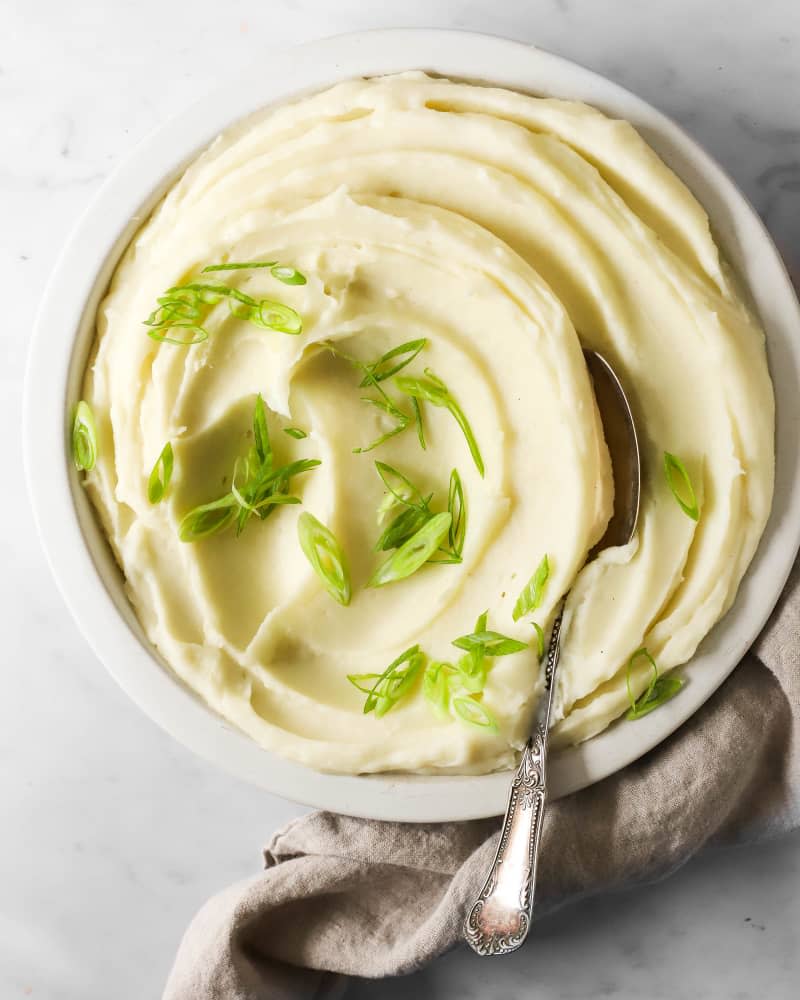How to Thicken Your Mashed Potatoes When They Go Runny on You

It happens to the best of us: In the hustle and bustle of cooking you’ve accidentally added too much liquid to your mashed potatoes and now they’re runny, not the fluffy mound you were dreaming of. How do you thicken runny mashed potatoes? No worries — you have a few different options. Here is how to whip those potatoes back into shape.
How Do Mashed Potatoes Get Runny in the First Place?
Maybe you already know the answer, or maybe cooking has been such a blur you’re wondering what just happened. Runny potatoes can happen for a few different reasons.
Too much liquid: This is the most common reason. In the mashing process you may have added too much milk or broth.
Boiled too long: Boiling your potatoes for too long can make them water-logged, which (you guessed it) can contribute to runny mashed potatoes.
Option 1: Add a Thickener
A thickening agent can come to the rescue — chances are, you have the answer to fixing runny mashed potatoes in your pantry. Adding a thickener can firm up your taters in a manner of seconds. Here are the ones we recommend.
Potato starch: This is the ideal thickening agent, and not just because it’s made from potato (although that sure does help). Potato starch has a lower gelatinization temperature — what that means for us is that it thickens food faster, and it results in a smooth, glossy texture. (It’s a handy pantry item to keep on hand for thickening other foods and sauces.)
Cornstarch: So you don’t happen to have potato starch in the pantry. In that case, cornstarch is a very good option. Like potato starch, it’s gluten-free, and it works quickly.
What we don’t recommend using is wheat flour. While it, too, can help thicken your potatoes, it will also give them a pasty flavor. Plus, the flour might not cook thoroughly in the process.
How to Add a Thickening Agent
For best results, add the thickener to warm but not hot potatoes. Make a slurry with the agent: In a small bowl, mix 1 tablespoon of the starch with 2 tablespoons of warm (not hot) water or broth until the starch is dissolved. Then stir the mix carefully into the potatoes over medium-low heat and stir gently until the potatoes thicken. Yes, you are adding more liquid to your potatoes, but in this case, the slurry will help distribute the starch so it doesn’t clump.
Option 2: Reduce with Heat
No thickeners? No problem. Help that extra moisture evaporate by heating your mashed potatoes.
Typically when you want to thicken a food like a sauce or gravy using heat, you reduce it over the stove while stirring. We don’t recommend this for mashed potatoes because they can get overmixed and gummy — plus they may stick to the bottom of the pan.
Instead, you can heat them in the oven. Spread the potatoes in a layer in a baking dish and bake uncovered in a 325ºF to 350ºF oven for 10 to 15 minutes.
Option 3: Add Potato Flakes
A third way to thicken runny mashed potatoes is to add … more potatoes, in the form of potato flakes. Instant mashed potatoes might not be your first choice for a holiday meal, but when added to fresh mashed potatoes, they can help thicken without detracting from the flavor.
Gently stir a tablespoon of potato flakes at a time into warm (not hot) potatoes until you reach your desired thickness. By the way, we’ve tested different brands of instant mashed potatoes and have a couple of recommendations for you.
Got another mashed potato emergency? Check out our list of the top mistakes people make when cooking mashed potatoes.

